Brewing kombucha is a controlled growth of bacteria and yeast, meaning you need to keep your supplies clean to prevent bad germs from sneaking in! Here’s how to sterilize and clean your kombucha supplies.
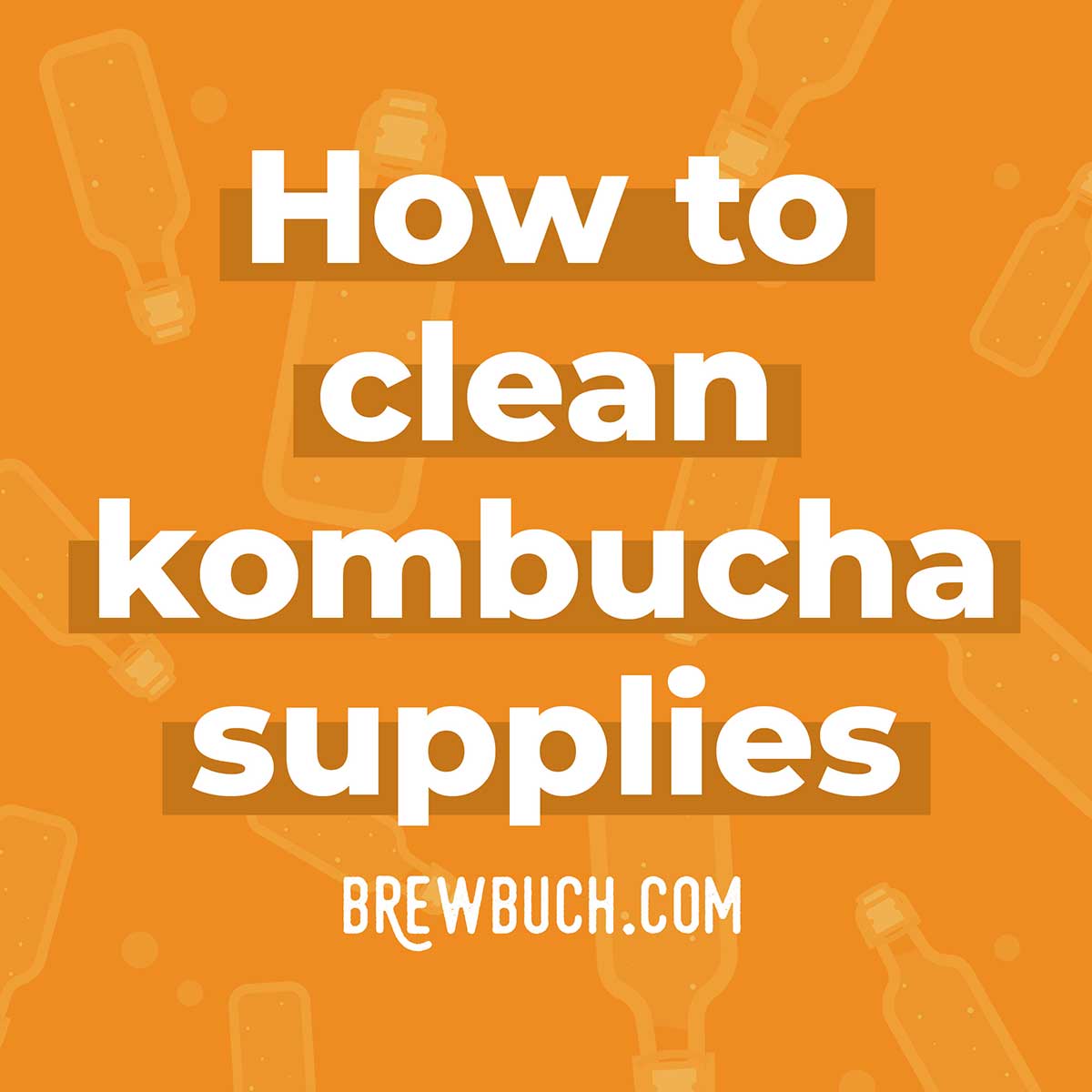
Making kombucha, along with any fermentation, is a practice in controlling microorganisms. Balancing the good bacteria and yeast against the bad guys to prevent mold and create delicious kombucha!.
The kombucha naturally defends itself somewhat, with its acidic, low pH killing off many potential pathogens (especially with continuous brewing). But with clean equipment, delicious kombucha success is inevitable! Here’s how I sterilize and clean my kombucha supplies.
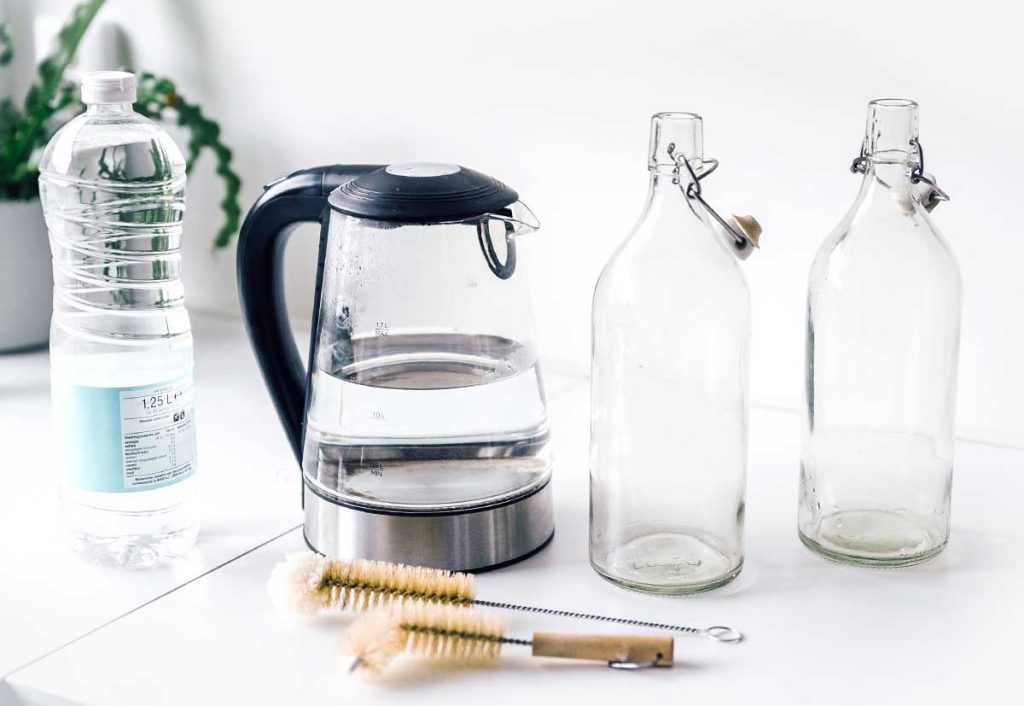
How to clean kombucha supplies
I follow two general steps when cleaning my kombucha gear:
- Rinse with distilled white vinegar: Highly acidic and perfect for killing off the bad bacteria that may be hiding out on your supplies. Simply swish it around your bottles and jugs, or pour it over your supplies (such as funnels or spoons). (Note: Do not use raw or apple cider vinegar, which may contain nematodes called vinegar eels!)
- Rinse with hot hot water: What the vinegar doesn’t kill, the hot water will! Carefully pour hot water into bottles and jugs, or submerge smaller supplies in the water. Swish it around so that it touches every surface, then pour out. Let supplies cool before pouring in the kombucha. (Shocking glass with hot water can cause it to crack – to prevent this, add just a little water and swish it around to warm up the glass before adding more!)
With your newly sterilized supplies, it’s important to pay attention to what other materials might be touching your equipment and ensure that they’re also clean. For instance, rather than use hand towels use paper towels. Avoid using a dirty kitchen sponge, which is laden with bacteria, and opt for a brand new sponge or paper towels instead.
And don’t forget to wash your hands! Similar to above, rinse your hands with vinegar then with warm water before touching your supplies or SCOBY.
Finally, avoid using soap, especially antibacterial soap. Antibacterial soap is indiscriminate in the bacteria it kills, and will hurt not only the bad but also the good bacteria (and in turn, hurt your SCOBY).
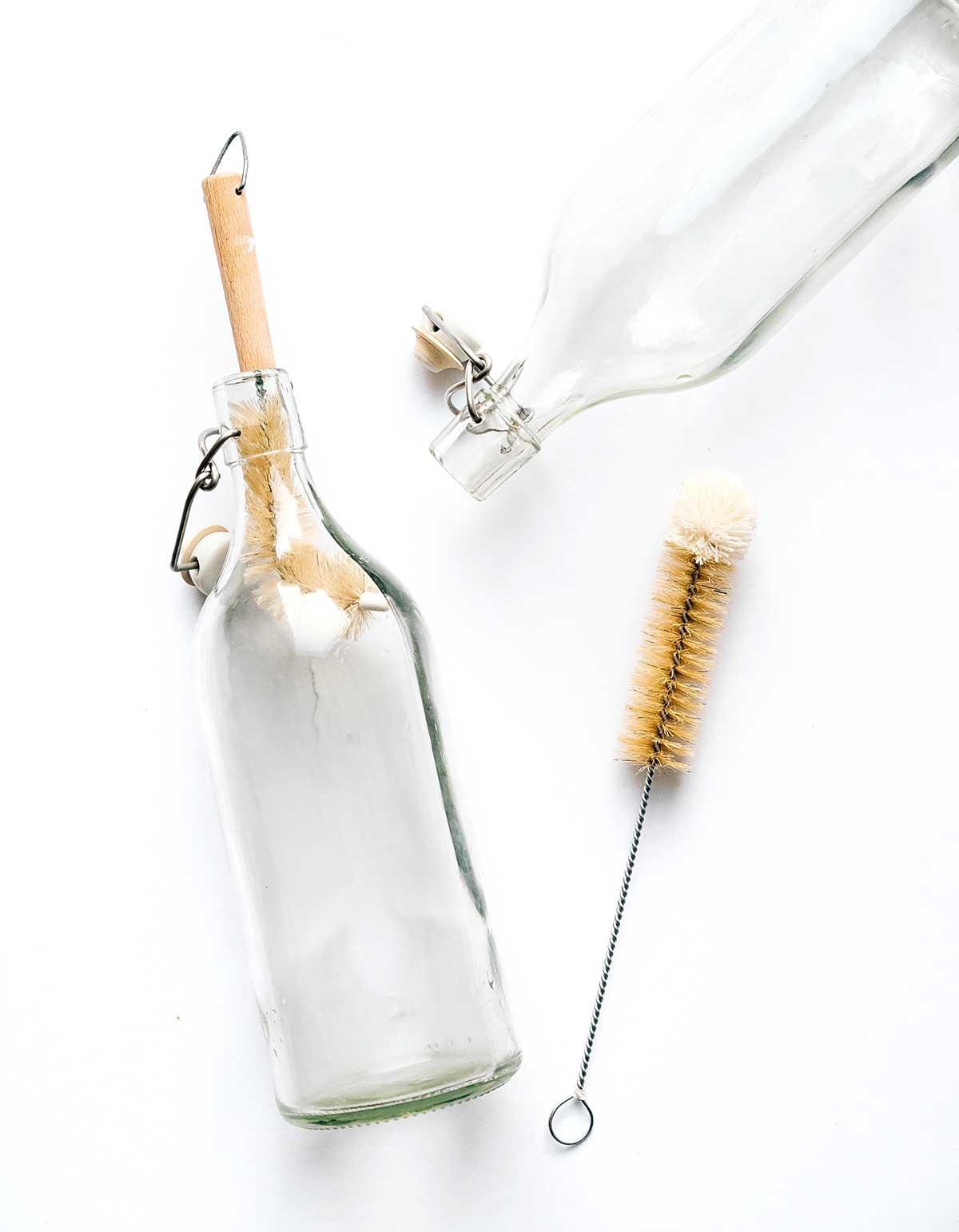
Need a deep clean?
Brushes: To remove crusted on debris (especially for the inside of 2nd fermentation bottles), it may be helpful to use bottle brushes.
Dishwasher: Have a lot of bottles that need cleaning? Stand them upside down in your dishwasher on the bottom rack. Run the dishwasher without any other dishes and without soap on its hottest setting!
Sterilizers: If you’ve been having issues with mold and want to be sure the spores are eradicated, try a sterilizing solution like Five Star or 1 Step.
And that’s basically it! Keeping a clean fermentation station doesn’t require much work or upkeep, just a bit of thought into what is coming into contact with your supplies. Happy brewing!
“How often do you recommend cleaning the container if doing continuous brewing?”
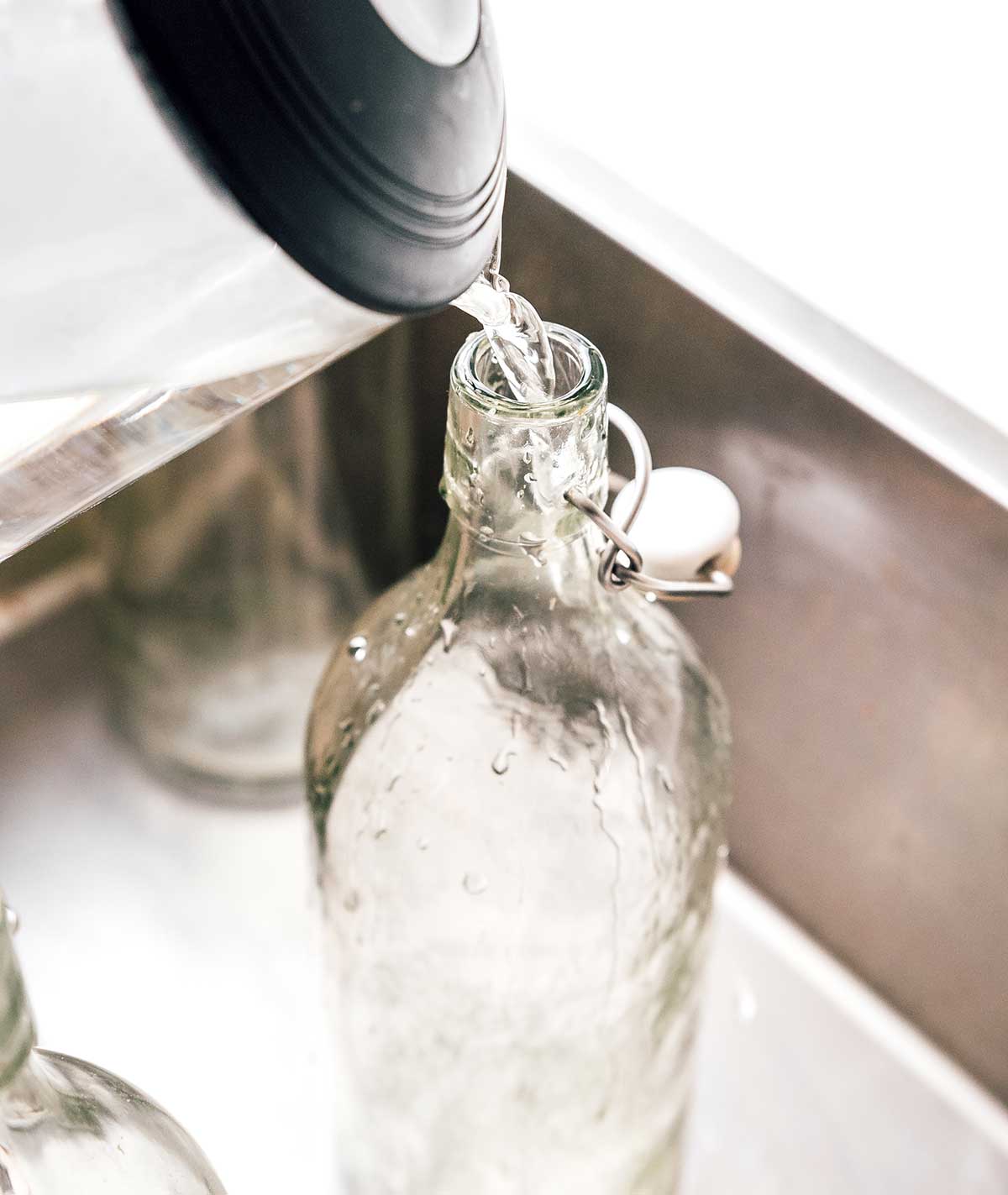
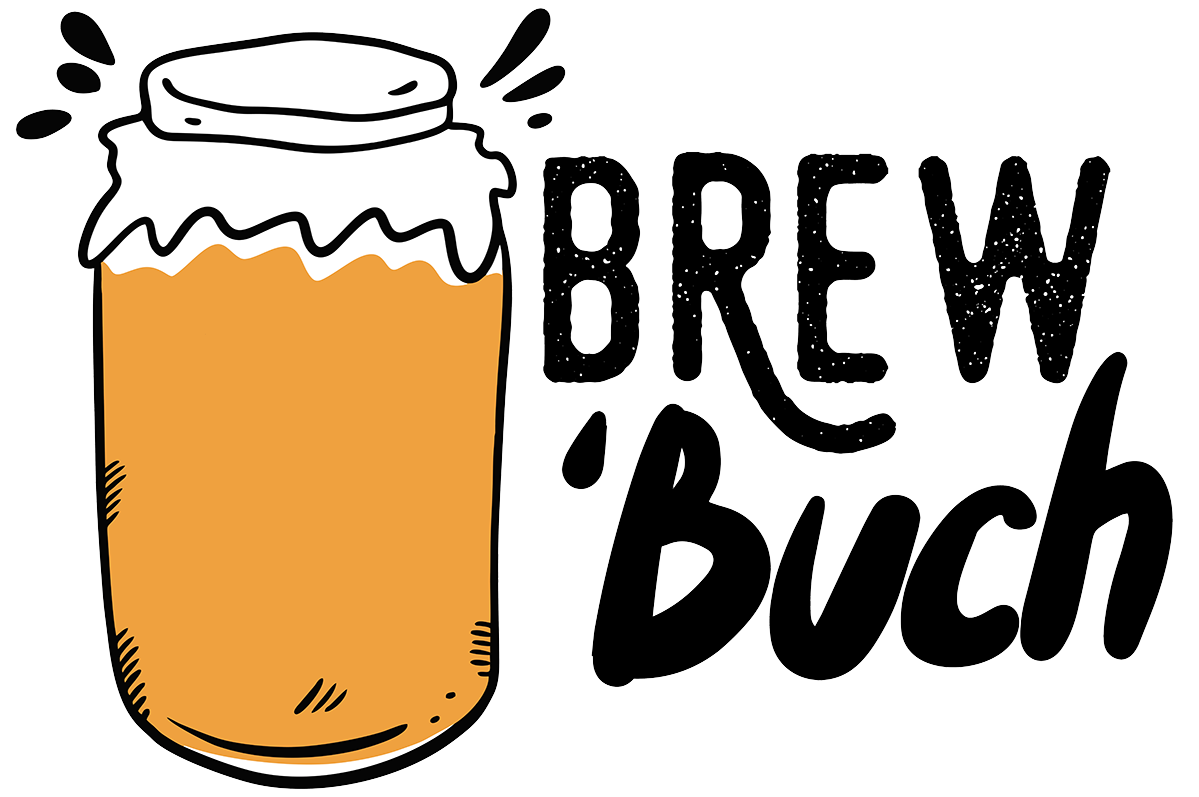
Hi, I have a very dirty gallon jar that was sitting outside at my friend’s house, so it has dirt in it (but it was free!). Would it be ok to use regular dish soap in it if I rinsed well and used vinegar and boiling water afterwards?
Yes absolutely! Be careful with the boiling water that it doesn’t break the glass.
Thank you for the great tips! I am planning to use cotton bottle covers. Could you also help me understand how do I keep my cotton bottle covers clean?
As long as the kombucha doesn’t touch them, I think they’ll stay pretty clean without any extra steps!
I also make wine as well now starting to make kombucha. For all my wine equipment I use One Step
no rinse sterilizing solution to sterilize all my equipment. Would this be a problem for sterilizing equipment to make kombucha?
This should work for buch as well! 😀
Hello beautiful soul,
I use H2O2 after cleaning with water and soap to sanitize my tools ,jars,bottles, jar covers
I just put enough drops in filtered water and spray anything ,leave it few minutes , then rinse with filtered water. Is that safe?
I think it would be safe!
Hi Sarah,
I am just starting my Kombucha and have two jars going as per instructions for starting to get scobies. I put one cup of store bought
kombucha divided into the two jars.
I was then looking at the first fermentation instructions and it also says that I need to put in another two cups of store bought kombucha, when do I stop using the store bought? Hopefully the next time I do the first fermentation on the next batch? Sorry for not comprehending your instructions and needing further clarification.
You can use the liquid in the jar with your SCOBY as starter, so you shouldn’t need to buy store bought again! 😀
I use StarSan, which I already have since I brew beer.
Hi Sarah! Thanks so much for all the great information! How often do you recommend cleaning the container (in the way you mentioned cleaning brewing supplies) if doing continuous brewing? Thank you so much!
Probably once every other month or so! Just to get off the built up sediments.
Hi
Can I use Milton solution to clean bottles etc?
I have tank water so after loosing my first batch I now boil all the water to make each batch.
Yep that should work! 😀
We just bottled our 1st batch of kombucha. We used pineapple juice as one of the flavors. After about 2 days of being in the bottle, we noticed 1 or 2 of our bottles look to have mold growing at the top. Any idea, why this may of happened? We santized the bottles with hot water before pouring in the kombucha and juice in. Any help is appreciated
Are you sure it’s mold? Mold in the 2nd ferm isn’t very common. Feel free to post a photo in our Facebook group for advice! Kickass Kombucha Brewers
Hey, Sarah ~
Lot’s of sweet information here! I’m a huge fan of Booch (GT’s is my favorite) am preparing to start brewing my own. I have 2 1-gallon jars with muslin cloths on their way to me and have a couple questions for ya.
First, does humidity in the home affect booch in any way?
And, on the topic of cleaning supplies, my dishwasher has a ‘sanitize’ setting. Is that a preferable option, or is it better to use the vinegar and hot water process?
I know I will have more questions coming up. Thanks so much for sharing your incredible info and how-to’s with us!
Cheers!
Hi Kathi! I would think that huge extremes in humidity could impact the kombucha, but it’s more about the temperature being right 🙂 And the sanitize setting in your dishwasher would be great!
I live in the islands so during rainy season mold grows quick. Anyway, I was in a rush brewing and grabbed my usual wooden spoon from a drawer to stir the new brew, without cleaning it, and later noticed there were mold spores on the two wooden utensils the spoon I used were sitting with in the drawer. What should I do with the brew I just made and the scoby in it?
Hmm you could start over, rinsing off the SCOBY to hopefully remove any mold spores that might be in there. Or you could wait it out and see if mold develops. Best of luck!
Do you have to wash the cloth you use to cover your kombucha after every brew?
Nope! I rarely wash it to be honest, only when it gets dirty (probably every few months).
May I use Manuka honey? I
While we don’t advise using honey in the first fermentation, you can in the second fermentation. More on sweeteners and sugars here. 😀
Hi Sarah,
I just threw my bottles into the dishwasher with other dishes and soap! Obviously I didn’t read this before hand :/ Can I just give them a quick rinse in hot water once they’re out and before I start my second fermentation?
Yep just rinse them out well before using! Dishwasher soap shouldn’t be a problem 🙂
I found a large jar with a spigot at a thrift store. I washed it in the dishwasher. I made my batch of kombucha but it grew mould. I am wondering if it is just impossible to clean around that spigot and if I should just abandon it, but I am not even sure that was the problem. What is your opinion on jars with spigots?
The spigot should be fine as long as it is fermentation grade (i.e. stainless steel) and very clean. I would take the spigot apart and clean it with boiling water, then reassemble.
I wash my bottles in the dishwasher with other dishes. When dry I store them in a cabinet in my kitchen. The bottles may sit there for several weeks between uses. Do I need to sterilized them again before use?
And I use a laundered tea towel for the top of the jar. I have heard that paper towels have chemicals. Which is right to use?
No need to sterilize if you cleaned them well. Perhaps just a quick rinse out with hot water before adding the kombucha! A clean tea towel works just as well as paper towels – I use both interchangeably.